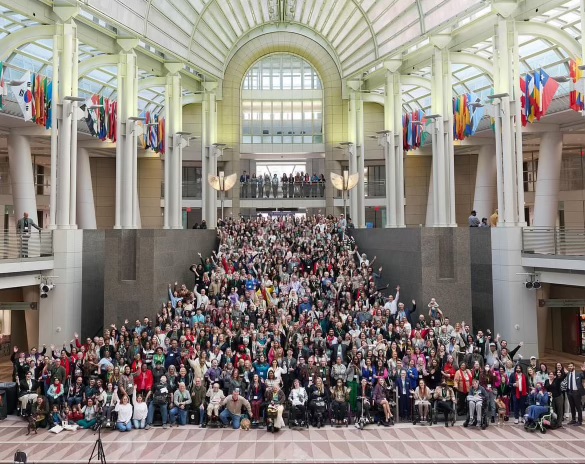
Posted by: Katie Boychuck
On February 26, 2024, I had the privilege, alongside nearly 1,000 other rare disease advocates, to speak to members of Congress and share my son Collin’s story and the challenges of MED13L. We put a spotlight on rare diseases. I stood alongside patients young and old, fellow caregivers, and parents who have lost their children to rare diseases. Together, we demanded that our representatives show their care for rare diseases. It’s hard to articulate all the emotions from that weekend. It was empowering to have a voice not just for Collin but for everyone affected by MED13L. Daily, I navigate a world where many take their health for granted, where the abilities of their children are assumed, while I watch my son attend endless therapy sessions to develop skills that others his age acquire naturally. I see my son struggle and harm himself out of frustration from being unable to communicate his needs. I feel isolated. Yet, at Rare Disease Week, organized by the EveryLife Foundation, I was reminded that I am not alone. Despite our varied paths, it was beautiful to share the journey with others who truly understand the meaning of “hard.” Next year, I hope you’ll join me. Together, we can share our MED13L stories with our representatives to ensure they recognize that ‘rare’ means recognized, not forgotten. You can learn more about the EveryLife Foundation and their mission here. Below is the brief story and request I shared with my members of Congress.
Honorable Members of Congress, I’m Katie Boychuck from the north side of Chicago, or simply Collin’s mom. Around 4 months old, Collin’s development diverged from that of his older brothers. He developed crossed eyes needing surgical repair, failed hearing tests, multiple hernias, and he stopped breathing at night—all necessitating surgery. He was no longer meeting his milestones. Life was just harder for Collin. The doctors recommended genetic testing but didn’t expect significant findings. That’s why, when a notification popped up in Collin’s chart, I was stunned: “MED13L mutation, pathogenic.” I wondered, what could these letters and numbers mean?
As I waited for the doctor’s call, I searched the internet, and the scarce information I found broke my heart: intellectual disability, non-verbal communication, seizures, heart defects, maladaptive behavior—no treatments, no cures. Suddenly, dreams of tee ball games and college visits were replaced by endless therapies and the stark reality of becoming a long-term care provider.
Imagine discovering your child has a condition so rare that even your doctor has to scour the internet for information. That’s our reality, a reality shared by many in the rare disease community. In the two years since Collin’s diagnosis, I’ve yet to meet a doctor or therapist familiar with MED13L before meeting him. Our journey led us to the MED13L Foundation, where I discovered that parents of children with special needs not only bear the burden of organizing but also funding the research essential for understanding and treating MED13L.
Today, I stand before you not just as a mother advocating for her son but for all affected by rare diseases, calling for increased NIH funding dedicated to rare disease research. This support is critical for advancing our knowledge, developing resources, and discovering treatments.
Investing in rare disease research ensures no family faces their journey alone. Together, we can make “rare” mean recognized, not forgotten.

Katie Boychuck
Katie Barry Boychuck has extensive corporate legal experience in nonprofit governance and financial reporting. She lives in Chicago with her husband Mike and three sons, Mac, Jack, and Collin, who was diagnosed with MED13L at 15 months old.

